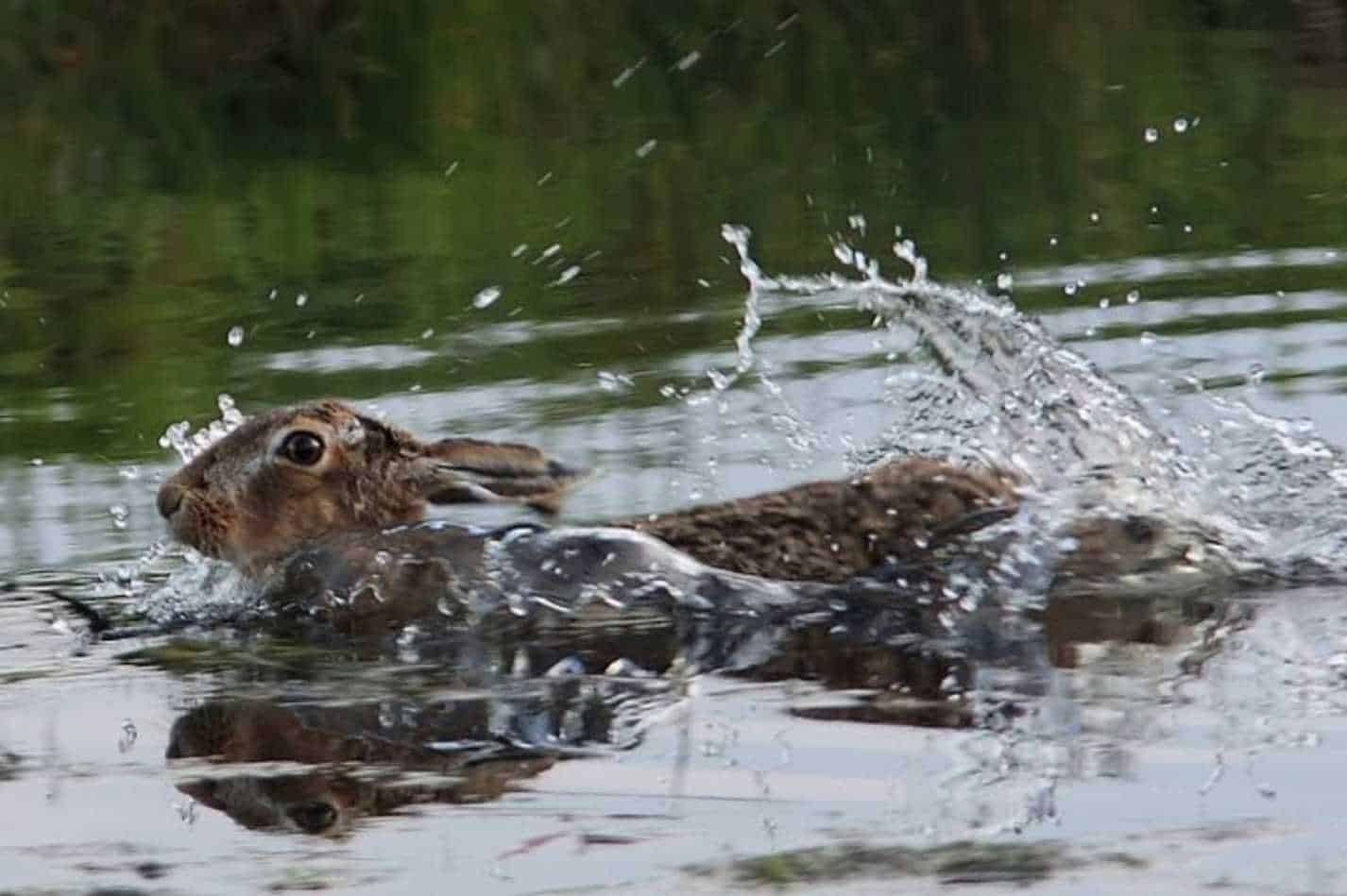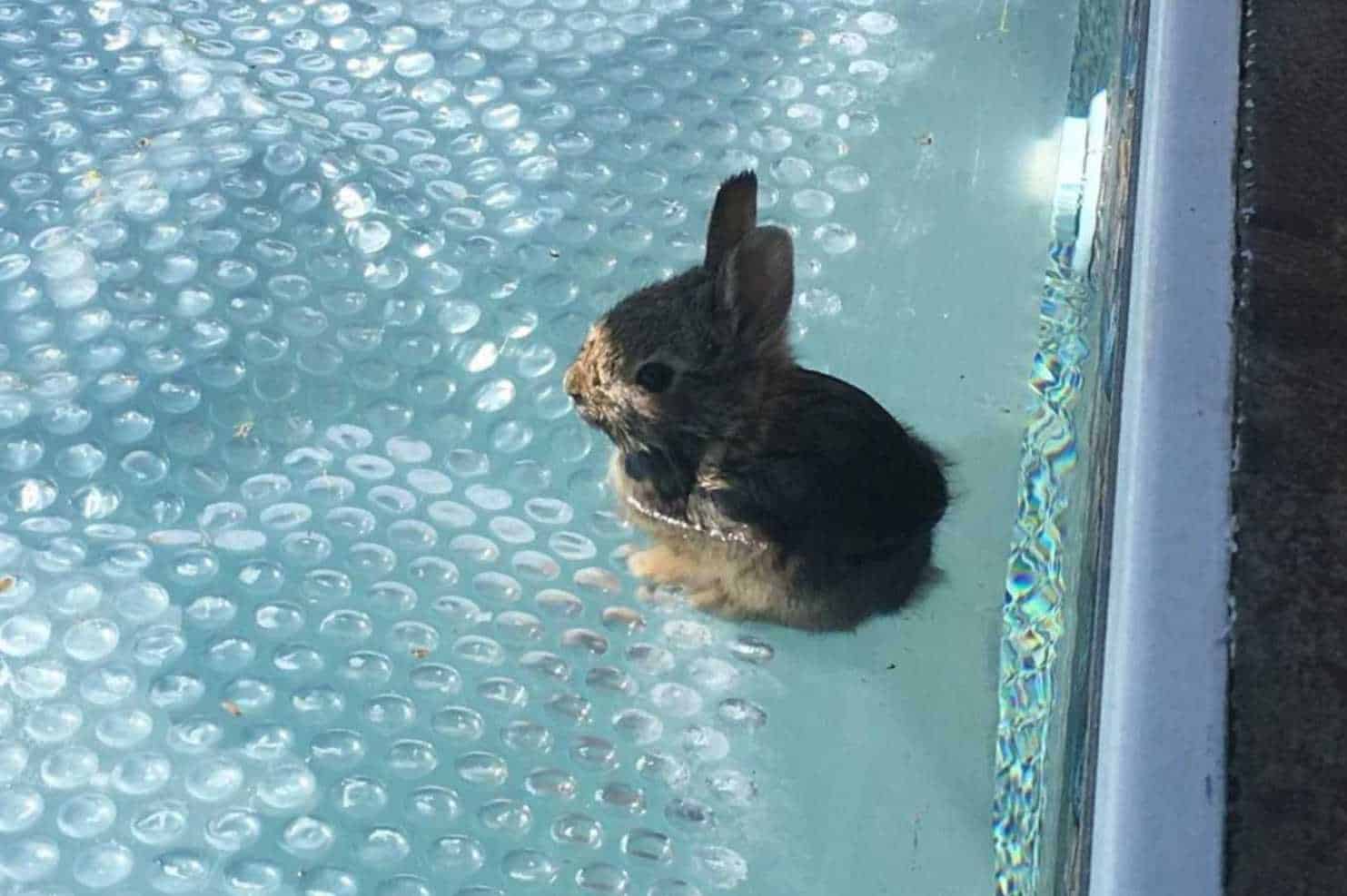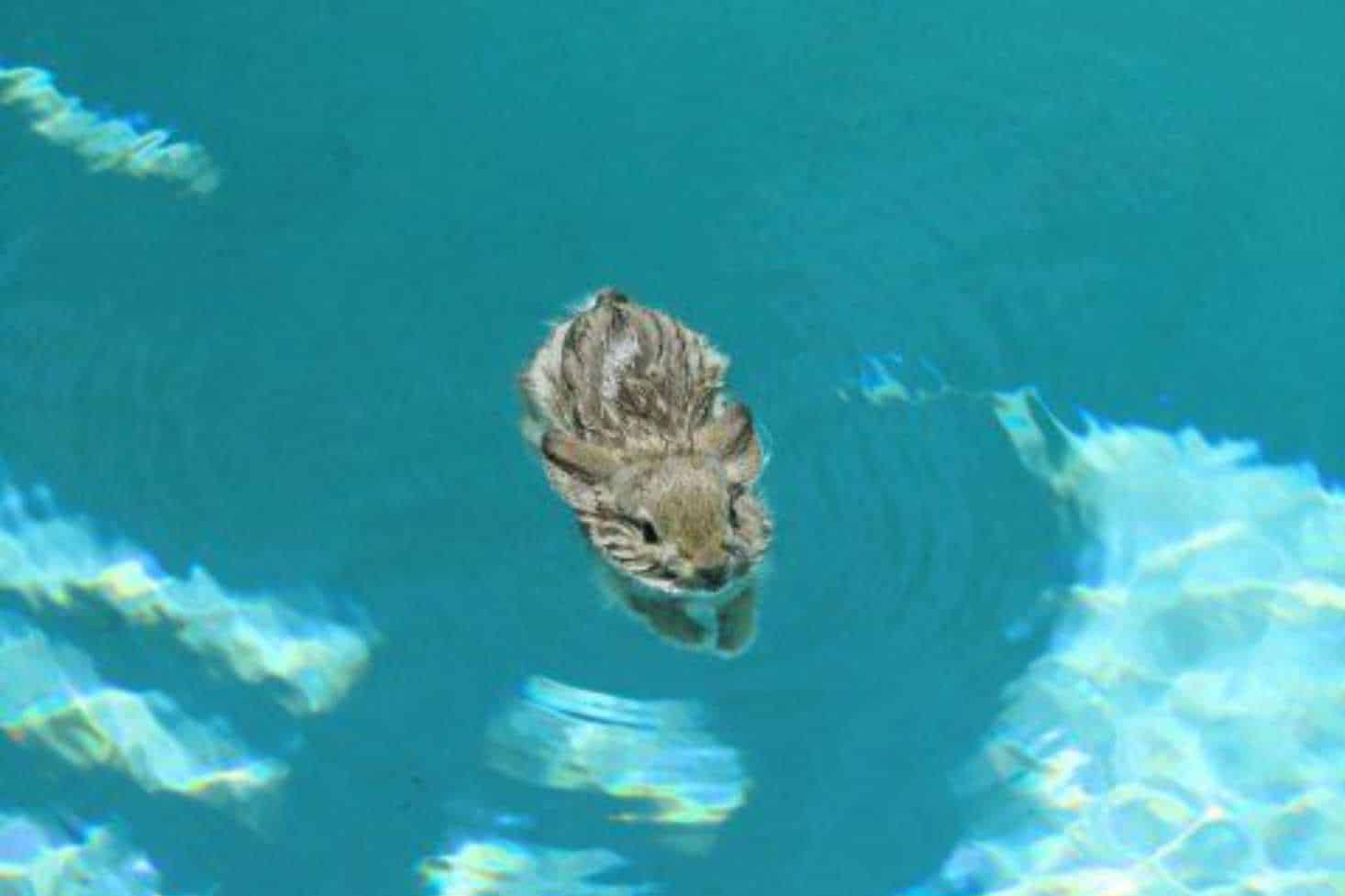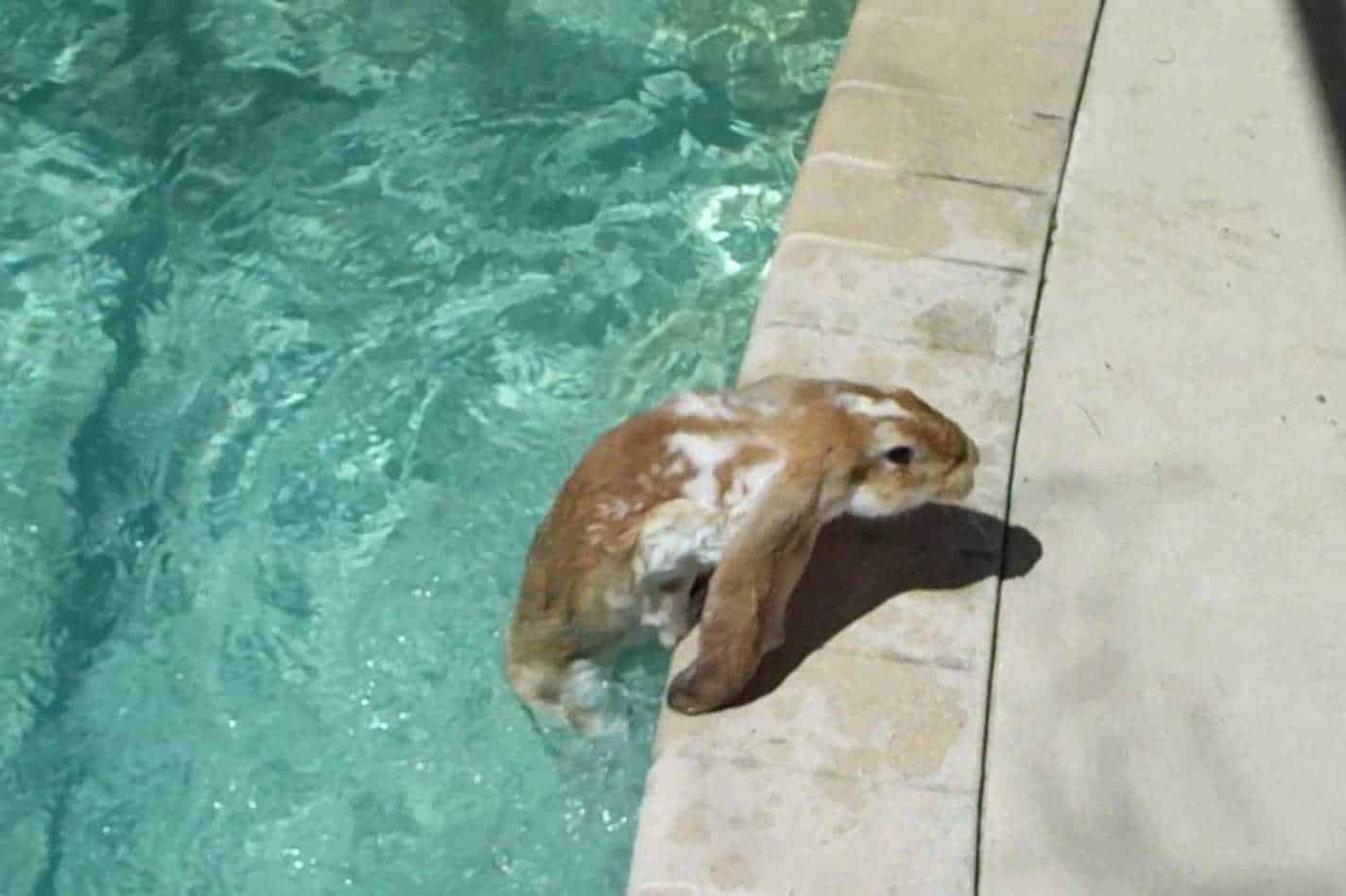Rabbits are mammals. Most mammals can swim. The question then is, “Can rabbits swim?” This is something that gets most people wondering. You’re probably aware that vets discourage bathing rabbits. They can even go through life without bathing. Will they enjoy swimming? Read on and find out how rabbits find swimming.
Can wild and adopted rabbits swim?

Yes, all rabbits, whether wild or adopted can swim. It’s a natural survival instinct for lagomorphs.You only have to look at two wild rabbit breeds to see that they can swim: Marsh rabbits and swamp rabbits. Both have adapted to live in damp areas and swim routinely in their daily lives.
Swamp rabbits are adept in swimming. Their large size allows them to swim well due to their greater buoyancy and musculature. They do it to stay alive: avoid predators, get food, and find partners.
Rabbits can normally swim after a week of being born. In certain breeds, it can take up to fifteen days. They employ their back and front legs in a doggy paddle. Wild rabbits may need to swim to survive. This may happen if they’re fleeing a predator. They only swim for the sake of survival, not for fun.
Take the Marsh Rabbit, for instance. It’s frequently spotted swimming through water to avoid a potential predator. However, you won’t see it frolicking in the wetlands any day. You can also find webbed feet on domesticated rabbits. However, this does not make them natural swimmers. Their webbed feet help keep them safe while hopping and running.
Pet rabbits do not need to swim. The only water they require is for drinking found inside their cage. They belong to a decent rabbit run, not in a pool of water. Water in huge quantities is frightening to them. Being wet and cold overwhelms their fragile bodies. Therefore, they try to avoid it.
Swimming isn’t a rabbit’s favorite pastime. It’s usually a ground-dweller, whether wild or adopted. It enjoys digging underground rather than swimming in water.
Do rabbits enjoy swimming?
Domesticated rabbits of various breeds have varying swimming inclinations. For example, the Flemish Giant rabbit dislikes getting wet. In contrast, the Belgian Hare enjoys splashing in puddles. Most rabbits hate swimming in general. Their soft coats can absorb lots of water. This makes them feel like swimming in a suit or dress. It makes it tiring and difficult to swim.
Your rabbit spends most of her time in a dry environment. It can’t keep its body heat if its fur becomes wet. Swimming makes your pet anxious due to its inability to regulate its body temperature. Consider what it would be like to be outside during a rainstorm in a heavy, woolen coat. A wet rabbit feels like this. Your pet can’t remove its fur either. So, the cold will seep through its bones.
Wet fur is a nuisance for rabbits. Even if its fur dries off, it may tangle. Grooming this can be difficult. You’ll have to use scissors to cut your bunny’s fur.
House rabbits also take a long time to dry off after being wet. Remember how it felt to go into an air-conditioned house after a swim? They experience this sensation long after the incident has ended. This is another reason they avoid large bodies of water.
How can you tell if your rabbit enjoys swimming?

It’s a tricky balance to test your rabbit’s bond with water. Never take a “sink or swim” method. Your bunny will panic if you drop it into the water. By default, your rabbit will sink. Examine your rabbit’s reaction to water. Mist the hutch of your pet. If it shows a negative reaction, it means it despises the sensation of water. If it doesn’t enjoy the mist, it will despise swimming much more.
Also, consider how your bunny reacts when you bathe it. Is it trying to get away from the washcloth? If that’s the case, it means it despises being wet in any form. If not, you can increase the testing time.
Furthermore, check your rabbit’s attitude toward its water bowl. Some rabbits regard it as a toy. If your pet dips its paws in the bowl, it may like the sensation of water. It could also toss the bowl around and splash about in the puddles.
If you think your pet rabbit enjoys swimming and approaches the water on its own, do not leave it in the water for over five minutes. Staying longer in water may cause it to become weary or chilly and suffer from hyperthermia.
Is swimming safe for rabbits?

A rabbit would run, hop, flop, jump and learn new stunts than get in the water. Excessive moisture can cause baldness, dermatitis, and so on. Rabbits get startled easily. Being suddenly immersed in water could be too much for them to handle. A rabbit will likely suffer a heart attack due to the shock and die.
Rabbits must breathe via their noses to survive. While swimming, this can be challenging. It is harmful if they swallow large amounts of water. Subsequent drowning is always a possibility. Water may also contain parasites and other risks. Wild sources of water carry bacteria. Other water sources may contain chlorine, which is harmful to rabbits.
If at all possible, keep your rabbit from becoming entirely wet. It can lead its body temperature to dip to dangerously low levels shortly. Furthermore, the switch from moist to dry can irritate its sensitive skin.
If your rabbit falls into a pond, pool, or bathtub by mistake, get it out as soon as possible! Once it’s on dry land and feeling safe, wrap it in a clean towel. Gently and thoroughly dry it. Don’t use blow dryers because they can damage your rabbit’s sensitive skin.
Can rabbits swim in pools?

Never allow rabbits to swim in pools. Allowing your bunnies to do so carries some risks. Imagine leaving a baby alone in the swimming pool. It is so easy to get drowned even with people around. When a child can’t keep its head above water, he grabs, claws, and does whatever he can to find something to cling to.
The rabbit behaves the same way. It will get to safety by biting, scratching, or clawing. It’s simple for it to be overtaken by the water and drown in terror. Even if it doesn’t, getting water into its ears and lungs has severe implications. Another factor to consider is the chemicals present in a swimming pool. It hurts if chlorine gets into your eyes. How much more for a rabbit?
In addition, when a rabbit gets exposed to chemicals, it can suffer from asthma and sinus. These health issues can lead to a costly vet visit. Chemicals can also be harsh on sensitive skin. If consumed, they can be fatal to your rabbit.
Some people also consider immersing a rabbit in a swimming pool as animal cruelty. This is because of its susceptibility and its sensitive system. Keep your pet rabbit away from the pool as much as possible.
First, you can’t push a rabbit into the water. That is something you should never do. Forcing your pet to perform something it doesn’t want to do is not only cruel. It also puts your rabbit in danger of injuring herself.
If you force your rabbit into the water against its choice, it may attack you or injure itself. This is because rabbits want to keep themselves dry and clean at all times. They aren’t used to remaining wet for long periods.
If you’re a caring rabbit parent, you should be aware that it’s critical to keep a rabbit’s sensitive ears dry at all times. Water can go into its ears, eyes, nose, and mouth if you let it swim in a pool.
The trapped water not only causes illnesses but also harms a bunny’s digestive tract if consumed. Water in swimming pools is high in chlorine, which is toxic to rabbits.
Those lovely videos of bunnies resting contentedly on their backs are anything but adorable. They may already be undergoing tonic immobility or “playing dead.” This is the state in which a bunny flops on its back and appears motionless.
This is something a rabbit will do only if it is terrified to death. It is a rabbit’s involuntary response, and it is not pleasant.
When you see a video of a rabbit swimming on YouTube or other social media platforms, pay attention to its body language. Look for the indicators listed below:
- A pair of large, staring eyes that don’t blink
- Muscles that have become stiff
- Shaking
- Heavy breathing
- Flattening
- Freezing
All of the indications listed above suggest anxiety and tension.
Benefits of Allowing Rabbits to Swim

You’ll probably be startled to find that a rabbit physician may recommend that your pet bunny learn to swim on occasion.
Elderly rabbits can benefit from hydrotherapy. It is also called aqua therapy or sometimes swimming therapy. Paddling in the water can help them relax. It also reduces inflammation in their joints.
However, professionals should monitor these sessions, not just anyone. They conduct these in a controlled atmosphere.
Summary
Can rabbits swim? Yes, they can, but it’s all about survival. Rabbits swim because they have to. Most rabbits don’t enjoy swimming. So, keep your pet rabbit away from sources of water at all times. Let it stay on dry land unless it has shown to be a proficient swimmer.